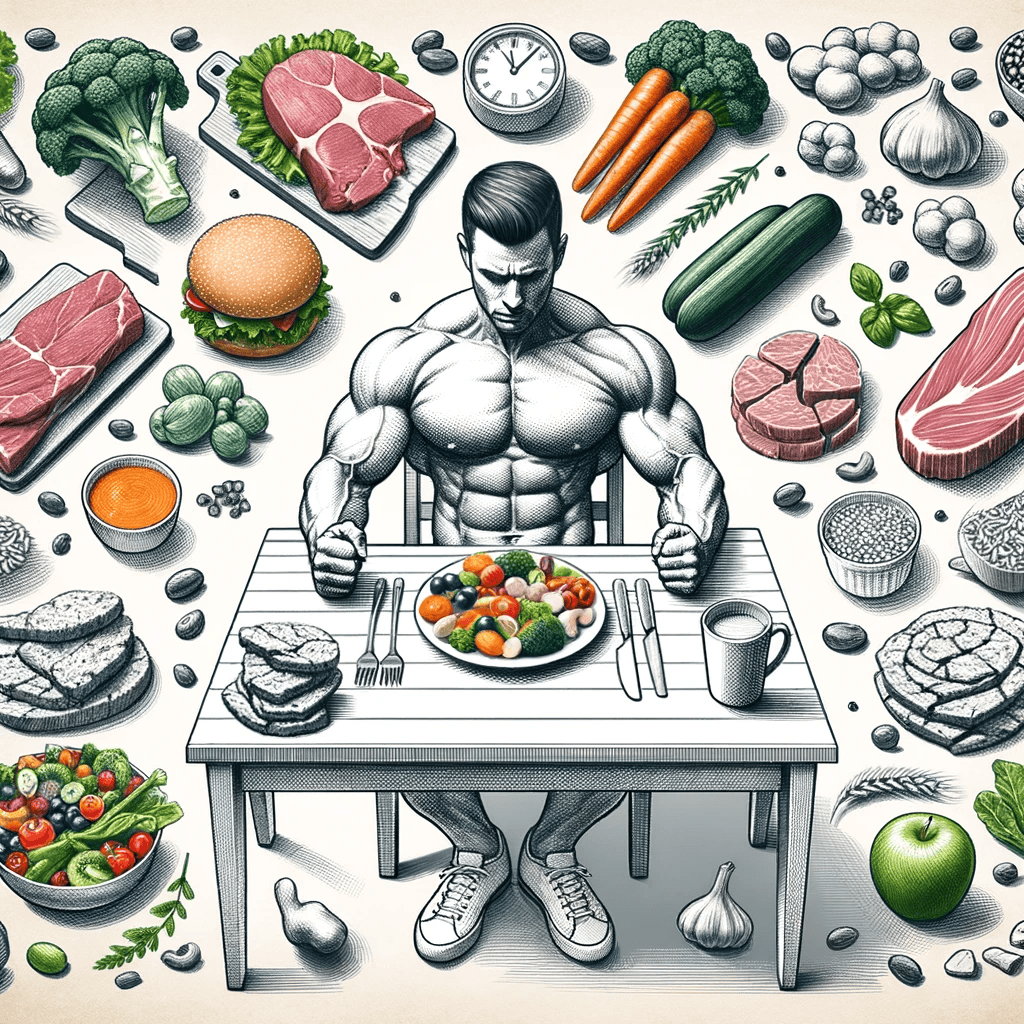
If you're a hardgainer, you know the struggle of putting on muscle mass.
You hit the gym regularly and lift heavy, but still, the scale doesn't budge.
What gives?
The answer often lies in your nutrition, specifically what you eat before and after your workouts.
This guide will break down the essentials of pre and post-workout nutrition to help you maximize your gains.
The key to unlocking muscle growth isn't just about what you do in the gym; it's also about what you put on your plate.
By optimizing your pre and post-workout meals, you can fuel your workouts, speed up recovery, and finally see the muscle gains you've been working for.

You might think, "I eat plenty, but I'm still not gaining weight." The truth is, not all calories are created equal, especially regarding muscle growth.
Your body needs specific nutrients to optimize muscle protein synthesis and recovery.
Hardgainers often struggle to put on muscle mass, and nutrition plays a crucial role in this challenge.
Knowing what to eat before and after workouts can significantly affect muscle gains and overall performance.
This article will delve into the science-backed recommendations for pre and post-workout nutrition tailored to hardgainers.
To maximize your gains and performance, it's essential to consume the right nutrients before and after your workouts.
What Research Says:
According to a study published in PubMed, nutrient supplementation timing appears to augment body composition changes and strength.
Pre-workout supplementation with a multi-ingredient formula containing caffeine, HMB, and vitamin D can significantly increase lean mass and lower- and upper-body strength.
Common Foods And Their Benefits:
Recommendations:
What Research Says:
The concept of the "anabolic window" has been widely debated.
However, a study on Protein timing and its effects on muscular hypertrophy suggests that the timing of protein ingestion impacts muscle gains.
Common Foods And Their Benefits:
Recommendations:
It's essential to note that the rate of muscle gain can vary between natural athletes and those using performance-enhancing substances.
The recommendations in this article are intended for natural athletes.

Start by incorporating these nutritional guidelines into your daily routine.
You can follow this hardgainer workout plan for a more detailed plan to gain mass quickly.
Nutrition is a key factor in muscle gain, especially for hardgainers.
Following these pre- and post-workout nutritional guidelines can optimize your muscle gains and overall performance.
Always consult with a healthcare provider for personalized advice.
Eating too close or far from your workout can leave you feeling sluggish or low on energy. Aim to have your pre-workout meal about 1-2 hours before hitting the gym.
There's a lot of debate about the "anabolic window," but most experts agree that consuming a post-workout meal within 2 hours can maximize muscle recovery and growth.
As a skinny guy, you need all the calories you can get at any time, as your stomach is probably small, and eating as many calories as possible may get uncomfortable.

While whole foods should be your primary source of nutrients, supplements can provide a convenient and quick source of nutrition when needed.
Creatine is the most researched and proven supplement for increasing muscle mass and strength.
It's safe and effective for most people.
These minerals are essential for recovery, stress management, and sleep quality. They also play a role in hormone optimization.
"I don't have time to cook." Meal prep on weekends.
"I'm not hungry." Eat smaller, more frequent meals.
"I can't afford supplements." Focus on whole foods; they are often cheaper and more effective.

If you're not a fan of meticulously weighing every morsel of food, don't worry; you can still effectively add calories to your diet.
One of the simplest ways is to use consistent measuring utensils for your food.
For example, always use the same cup to measure out your rice or the same spoon for your peanut butter.
This helps you get a rough but consistent estimate of your caloric intake.
Cooking for the week is another strategy to help you control your portions and ensure you eat enough.
Prepare large batches of calorie-dense foods like chicken, rice, and vegetables, and portion them out for the week.
This saves time and makes it easier to track what you're eating.
The scale is your friend when it comes to tracking progress.
Weigh yourself weekly at the same time and under the same conditions.
If after 3-4 weekly weigh-ins you notice that your weight isn't trending upward, it's a clear sign that you need to eat more.
Simply add more food to your plate and incorporate additional snacks throughout the day.
Once you see your weight trending upwards, you can be confident that you're in a caloric surplus, meaning you consume more calories than you're burning.
This is crucial for muscle gain and will help you add those coveted 10 pounds.
By using these simple yet effective strategies, you can ensure you're getting the calories you need for muscle gain without the hassle of weighing every single item of food.
It's all about making smart choices and being consistent with your eating habits.
You've read the guidelines and understood the science; now it's time to implement this knowledge.
Here's how to proceed:
Step 1: Plan Your Meals In Advance
Start by planning your meals for the week.
Make a grocery list with all the essential foods mentioned in this guide, such as eggs, oatmeal, chicken, and sweet potatoes.
Prepping your meals in advance ensures that you'll have the right nutrients available when you need them.
Step 2: Set A Routine
Consistency is key. Set a specific time for your workouts and meals.
This will help you maximize nutrient timing, which can be crucial for muscle gains.
Step 3: Monitor Your Progress
Keep track of your weight, muscle mass, and overall performance.
If you're not seeing the desired results, revisit your nutritional plan.
You might need to adjust your caloric intake or the balance of macronutrients.
Step 4: Consult a Healthcare Provider
While this guide provides general recommendations, individual needs can vary.
It might be beneficial to consult a healthcare provider for personalized advice, especially if you have pre-existing health conditions.
Step 5: Stay Committed
Results won't come overnight. Stay committed to your plan, be patient, and don't get discouraged if progress seems slow.
Remember, consistency over time yields results.
Step 6: Revisit And Revise
As you progress, your nutritional needs may change.
Make it a point to revisit this guide and update your plan as needed.
You can follow this workout plan for a more detailed plan to gain mass quickly for hardgainers.
By following these steps, you'll be well on your way to making the most of your pre and post-workout nutrition, optimizing your muscle gains, and improving your overall performance.
The journey of a thousand miles begins with a single step, and you've just taken that step by equipping yourself with the right knowledge.
Now, it's time to walk the path.

What are some other common misconceptions about muscle gain?
Many people believe that lifting heavier weights will automatically result in bigger muscles. While lifting heavy is important, it's also crucial to focus on the right form and technique. Overtraining is another misconception; more is not always better. Rest and recovery are just as important for muscle growth.
How can one maintain muscle gains in the long term?
Long-term muscle maintenance requires a consistent approach to training and nutrition. You can't just hit your goal and then revert to old habits. Keep up your protein intake, continue lifting weights, and adjust your caloric intake as needed.
What psychological barriers to muscle gain and how can they be overcome?
Psychological barriers can include a lack of confidence, fear of failure, or even fear of success. Overcoming these requires a strong mindset, perhaps with the help of a mental coach or supportive community. Setting achievable goals and tracking your progress can also help.
Is it necessary to take supplements for muscle gain?
While supplements can aid muscle gain, they are not a substitute for a good diet and consistent exercise. Supplements like creatine and protein powders can help but won't compensate for poor eating habits or lack of training.
What role does sleep play in muscle gain?
Sleep is crucial for recovery and muscle growth. During sleep, your body repairs the muscle tissue damaged during workouts. Aim for at least 7-8 hours of quality sleep per night.
Is cardio detrimental to muscle gain?
While excessive cardio can interfere with muscle gain, a moderate amount can be beneficial. It can help with recovery and overall fitness, aiding muscle growth.
How important is hydration for muscle gain?
Hydration plays a significant role in muscle recovery and growth. Water is essential for various bodily functions, including nutrient transport to your muscles.
Can women follow the same muscle gain strategies as men?
While the basic principles of muscle gain apply to both men and women, hormonal differences play a role. Women may gain muscle slower, but the approach—consistent training and proper nutrition—remains the same.
Is it possible to gain muscle on a vegetarian or vegan diet?
Yes, it's entirely possible to gain muscle on a vegetarian or vegan diet. The key is to ensure adequate protein intake from plant-based sources like lentils, chickpeas, and tofu.
How do I know if I'm overtraining?
Signs of overtraining include persistent fatigue, decreased performance, increased susceptibility to injuries, and sleep disturbances. If you experience these symptoms, it may be time to reassess your training regimen.
Gaining muscle as a hardgainer is not an impossible challenge.
With the right pre and post-workout nutrition, along with a consistent and well-planned workout regimen, you can make significant gains.
Remember, it's not just about what you do in the gym; it's also about what you consume before and after your workouts. Stay committed, stay fueled, and the gains will follow.
For a more comprehensive guide on gaining muscle mass quickly, check out our detailed guide on how to gain 10lbs of muscle quickly.
Useful Links
 About FitFrek
About FitFrekFitFrek operates as an independent platform, offering comprehensive workouts, programs, routines, guides, and unbiased reviews to accelerate your progress. We pride ourselves on our honesty, delivering straightforward and candid insights. FitFrek does not offer medical advice, diagnosis, or treatment services.